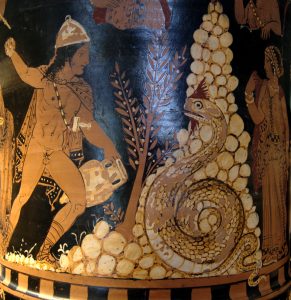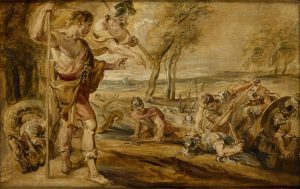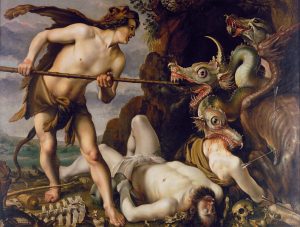19 Cadmus in Ovid
Bk III:1-49 Cadmus searches for his sister Europa
And now the god, dispensing with the deceptive image of the bull, confessed who he was, and made for the fields of Crete. Meanwhile Europa’s father, in ignorance of this, orders his son Cadmus to search for the stolen girl, and adds that exile is his punishment if he fails to find her, showing himself, by the same action, both pious and impious. Roaming the world (for who can discover whatever Jupiter has taken?) Agenor’s son, the fugitive, shuns his native land and his parent’s anger and as a suppliant consults Apollo’s oracle and asks in what land he might settle. Phoebus replies ‘A heifer will find you in the fields, that has never submitted to the yoke and is unaccustomed to the curved plough. Go where she leads, and where she finds rest on the grass build the walls of Thebes, your city, and call the land Boeotia.’
Cadmus had scarcely left the Castalian cave when he saw an unguarded heifer, moving slowly, and showing no mark of the yoke on her neck. He follows close behind and chooses his steps by the traces of her course, and silently thanks Phoebus, his guide to the way. Now he had passed the fords of Cephisus and the fields of Panope: the heifer stopped, and lifting her beautiful head with its noble horns to the sky stirred the air with her lowings. Then looking back, to see her companion following, she sank her hindquarters on the ground and lowered her body onto the tender grass. Cadmus gave thanks, pressing his lips to the foreign soil and welcoming the unknown hills and fields.

Intending to offer a sacrifice to Jupiter, he ordered his attendants to go in search of water from a running stream for a libation. There was an ancient wood there, free from desecration, and, in the centre of it, a chasm thick with bushes and willow branches, framed in effect by stones making a low arch, and rich with copious springs. There was a snake sacred to Mars concealed in this cave, with a prominent golden crest. Fire flickered in its eyes, its whole body was swollen with venom, its three-forked tongue flickered, and its teeth were set in a triple row.
After the people of Tyre, setting out, a fatal step, reached the grove, and let their pitchers down into the water, it gave out a reverberation. The dark green snake thrust his head out of the deep cavern, hissing awesomely. The pitchers fell from their hands, the blood left their bodies, and, terrified, a sudden tremor took possession of their limbs. The snake winds his scaly coils in restless writhings, and, shooting upwards, curves into a huge arc. With half its length raised into thin air, it peers down over the whole wood, its body as great, seen in its entirety, as that Dragon that separates the twin constellations of the Bear. Without pause he takes the Phoenicians, whether they prepare to fight, run, or are held by fear itself. Some he slays with his bite, some he kills in his deep embraces, others with the corrupting putrefaction of his venomous breath.
Bk III:50-94 Cadmus kills the Dragon
The sun had reached the heights of the sky, and driven away the shadows. And now the son of Agenor, wondering what has delayed his friends, searches for the men. He is covered with the pelt stripped from a lion. His sword is tipped with glittering iron. He has a spear, and better still a spirit superior to all. When he enters the wood and sees the dead bodies, and over them the victorious enemy, with its vast body, licking at their sad wounds with a bloody tongue, he cries out ‘Faithful hearts, I shall either be the avenger of your deaths, or become your companion’.
So saying he lifted a massive rock with his right hand and with great effort hurled the huge weight. Steep walls with their high turrets, would have been shattered by the force of the blow, but the snake remained unwounded, protected by its scales like a

breastplate, and its dark, hard skin repelled the powerful stroke.
But that same hardness cannot keep out the spear that defeats it, that is fixed in a curve of its pliant back, and sinks its whole iron blade into its entrails. The creature maddened with pain twists its head over its back, sees the wound, and bites at the shaft lodged there. Even when the snake had loosened its hold all round by its powerful efforts, it could scarcely rip it from its flesh and the iron stayed fixed in its spine. Then indeed new purpose was added to its usual wrath: its throat swells, the veins fill, and white spume flecks its baleful jaws. The earth resounds to its scaly scraping and a black breath like that from the mouth of the Styx fouls the corrupted air. At one instant it coils in vast spiraling circles, at another rears up straighter than a high tree. Again it rushes on like a rain-filled river and knocks down all the trees obstructing it in front. The son of Agenor gives way a little withstanding its attacks by means of the lion’s skin and keeps back the ravening jaws by thrusting forward the point of his sword. The snake is maddened and bites uselessly at the hard iron and only drives the sharp point between its teeth.
Now the blood begins to drip from its venomous throat and soak the green grass with its spattering. But the wound is slight, because the serpent draws back from the thrust, pulling its wounded neck away, and, conceding its wound, keeps back the sword, and does not let it sink deeper. But the son of Agenor following it all the time presses the embedded iron into its throat, until an oak-tree blocks its backward course and neck and tree are pinned together. The tree bends under the serpent’s weight and the trunk of the oak groans with the lashing of its tail.
Bk III:95-114 Cadmus sows the Dragon’s teeth
While the conqueror stares at the vast bulk of his conquered enemy, suddenly a voice is heard. It is not easy to imagine where it comes from, but it is heard. ‘Why gaze, son of Agenor, at the serpent you have killed? You too shall be a serpent to be gazed on.’ For a long time he stands there quaking, and at the same time loses colour in his face, and his hair stands on end in cold terror. Then, behold, Pallas, the hero’s guardian approaches, sinking down through the upper air, and orders him to turn the earth and sow the dragon’s teeth, destined to generate a people. He obeys, and opening the furrows with a slice of his plough, sows the teeth in the ground, as human seed. Then, almost beyond belief, the cultivated earth begins to move, and first spear points appear among the furrows, next helmets nodding their painted crests, then chests and shoulders spring up, and arms weighed down with

spears, and the field is thick with the round shields of warriors. Just as at festivals in the theatre, when the curtain is lifted at the end, designs rise in the air, first revealing faces and then gradually the rest, until, raised gently and steadily, they are seen whole, and at last their feet rest on the lower border.
Bk III:115-137 Cadmus founds Thebes
Alarmed by this new enemy Cadmus was about to take up his weapons: ‘Keep away’ one of the army, that the earth had produced, cried at him ‘and take no part in our internal wars!’ So saying he raised his sharp sword against one of his earth-born brothers nearby, then, himself, fell to a spear thrown from far off. But the one who killed him lived no longer than he did and breathed out the air he had just breathed in. This example stirred them all equally, as if at a storm-wind, and, in their warring, these brothers of a moment were felled by mutual wounds. And now these youths, who were allowed such brief lives, were drumming on their mother’s breast hot with their blood. Five were still standing, one of whom was Echion. He, at a warning from Pallas, threw his weapons on the ground and sought assurances of peace from his brothers, and gave them in return. The Sidonian wanderer had these men as companions in his task when he founded the city commanded by Apollo’s oracle.
Now Thebes stands, and now you might be seen as happy, in your exile, Cadmus. You have Mars and Venus as your bride’s parents, and added to this the children of so noble a wife, so many sons and daughters, and dearly loved descendants, your grandchildren, who now are young men. But in truth we should always wait for a man’s last day, for that time when he has paid his last debt, and we should call no man’s life happy until he is dead.
Source: Ovid’s Metamorphoses, translated by Anthony S. Kline (https://ovid.lib.virginia.edu/trans/Metamorph.htm)